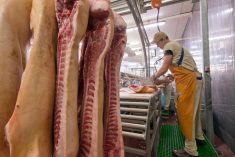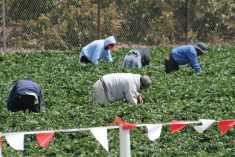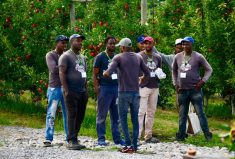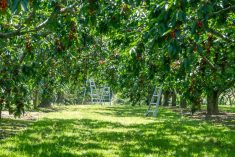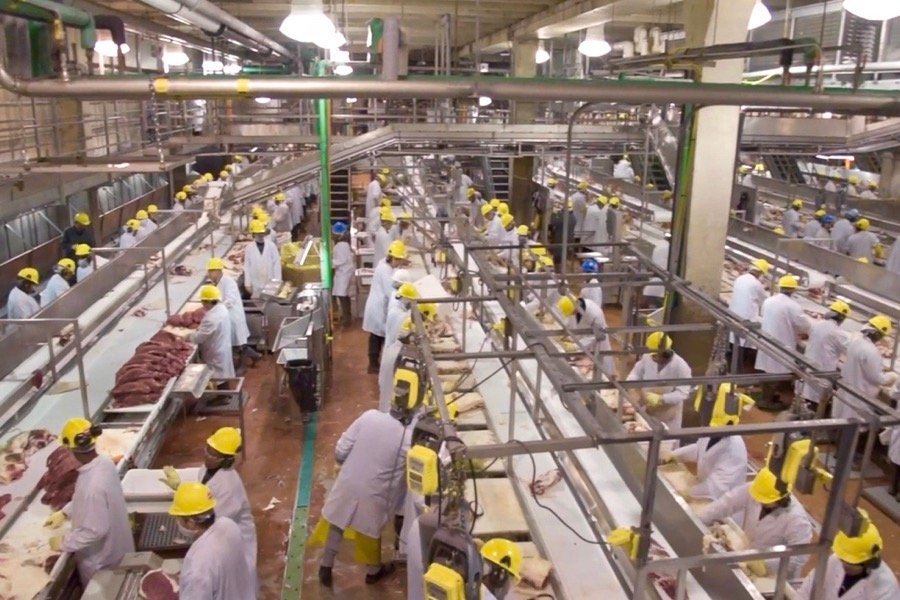Canada now plans to seek authorizations for flights to get foreign temporary and seasonal farm workers into the country, Agriculture Minister Marie-Claude Bibeau said Saturday.
The federal government said this week that temporary foreign workers (TFWs) and workers coming to Canada under the Seasonal Agriculture Worker Program (SAWP) will be exempt from the current federal ban on foreign nationals entering the country, imposed to limit the spread of the COVID-19 coronavirus.
Workers who enter the country will be required to observe a 14-day period of “supervised isolation,” she said Saturday, adding that all employers under those programs will be required to put that isolation period in place or may lose their TFW hiring privileges in the future.
Read Also

Alberta crop conditions improve: report
Varied precipitation and warm temperatures were generally beneficial for crop development across Alberta during the week ended July 8, according to the latest provincial crop report released July 11.
“Every measure will be taken to follow necessary health requirements, including thorough pre-screening, supervised isolation upon arrival, and employee monitoring,” she said in a separate statement.
During a ministerial press conference Saturday, Bibeau said the next step will be to work with relevant countries to obtain authorization for flights, which would be chartered by the industry and paid for by the workers’ employers.
TFWs and SAWP employees “should be starting to come in in the next few weeks,” she said, facilitated by FARMS Canada — the not-for-profit group which processes SAWP requests — and various industries.
Ottawa’s role now, she said, “is to obtain the travel authorizations for these workers.”
Generally, the government said Friday, exemptions to current air travel restrictions will apply to “foreign nationals who have already committed to working, studying or making Canada their home, and travel by these individuals will be considered essential travel for land border restrictions.”
Those exemptions include SAWP employees as well as fish and seafood workers, caregivers and all other TFWs as well as international students who held a valid study permit or approval for a study permit when the travel restrictions took effect Wednesday.
To further streamline the process for TFWs, the government said Friday, “temporary modification” is being made to the labour market impact assessment (LMIA) process for agriculture and food processing employers. That change will wave the two-week recruitment period for the next six months.
The maximum allowable employment duration of one year for workers in the “low-wage stream” of the federal TFW program will also be expanded, to two years. “This will improve flexibility and reduce the administrative burden for employers, including those in food processing,” the government said.
“We are still reviewing the details and will be in close contact with all relevant departments and industry stakeholders over the coming days to ensure these workers arrive safely and on time, while responsibly adhering to all public health requirements,” Canadian Federation of Agriculture president Mary Robinson said in a separate release Friday.
“Today’s announcement will ensure both a robust response to addressing the spread of the virus, and that our farmers, fishers and other producers have the workers they need, when they need them, to strengthen Canada’s food security and provide other vital services,” Immigration Minister Marco Mendicino said Friday.
Canada brings in about 60,000 temporary foreign workers per year for the agriculture and agri-food sectors, Bibeau said, describing them as “crucial to our food security and our rural economies.”
That said, she added, “there will always be opportunities available for Canadians interested in stepping forward to work on our farms and in food processing plants.”
During Saturday’s press conference, Bibeau thanked workers across the sector, including farmers, farm workers, processing plant workers, grocery store staff, food bank volunteers, truckers and others who continue to work despite their own concerns over the COVID-19 pandemic.
“Now more than ever, everyone can appreciate just how essential they are to our society.” — Glacier FarmMedia Network



